Carbon monoxide detectors play a critical role in helping to monitor your RV’s propane system and the air quality in your RV.
It closely monitors for the presence and concentration of carbon monoxide gas, which is odorless and tasteless. Not to mention potentially lethal!
When your RV’s carbon monoxide detector starts beeping, you need to take note.
It doesn’t do so frivolously, and you need to give it the time and attention to figure out what the problem is.
Though it’s important to note that not all carbon monoxide detector beeps indicate a deadly gas emergency.
There are also self-monitoring systems built into it. While they might not be as deadly as breathing in carbon monoxide gas, they still need your undivided attention.
Getting a better understanding of how a carbon monoxide detector operates and how to interpret the noises it makes, will help you troubleshoot a safe solution.
How Does an RV Carbon Monoxide Detector Work?
A carbon monoxide detector has a special silicon microchip, that is housed inside of a plastic shell.
A small electrical charge is sent to a tiny detection chamber that holds a highly sensitive carbon monoxide sensor.
The sensor is calibrated to actively detect and measure the carbon monoxide concentration in the surrounding air.
When it detects high levels of carbon monoxide, the microchip triggers an alarm beep.
In a lot of homes, the carbon monoxide detectors can be hardwired into the home’s electrical system, and contain a backup battery in case of a power outage.
Though most of the carbon monoxide detectors in an RV are battery-powered to reduce the ambient drain on the RV’s house battery bank.
What To Do When A RV Carbon Monoxide Detector Starts Beeping
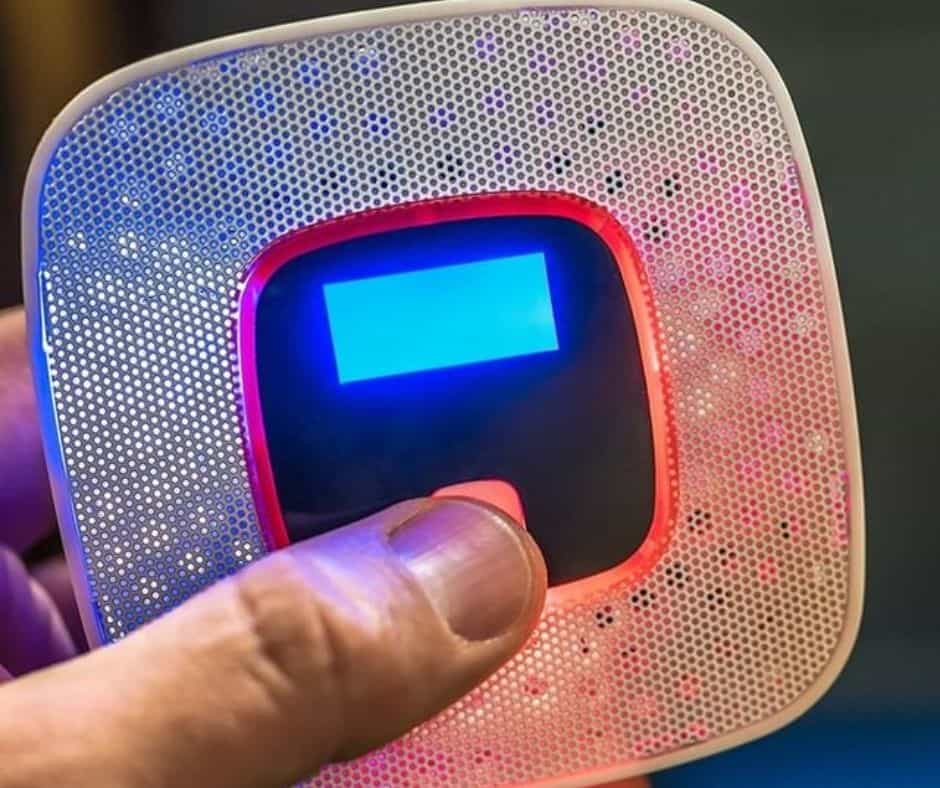
If your carbon monoxide detector is beeping, and you aren’t sure why it’s best to err on the side of caution.
Make sure to open all the windows to rapidly improve ventilation and turn off your RV’s propane system by closing the valve on the primary liquid propane tank.
If your carbon monoxide detector stops beeping, then you should take it as a sign that there is a fault somewhere in your RV’s propane system or your motorhome’s exhaust system.
If it continues to keep beeping, then it’s time to suspect the problem lies in the carbon monoxide detector itself, the battery or another mechanical fault.
Things That Can Cause An RV Carbon Monoxide Detector To Beep
There are a few different things that can create or release carbon monoxide in an RV.
If your carbon monoxide detector beeps four times, pauses and beeps four times again, it likely means that the parts per million of carbon monoxide inside your RV is approaching dangerous levels, and the detector is letting you know before there is a threat.
If your RV’s carbon monoxide detector makes emergency beeps, you should ventilate the area immediately, and consider the following potential causes.
1. RV Furnace
The propane burned in an RV furnace can produce a significant amount of carbon monoxide in a relatively short amount of time.
The risk is higher at night in cold weather when the furnace runs more often. This is why carbon monoxide detectors are usually installed near bedrooms.
2. Exhaust Leak
Older motorhomes can be prone to leaks in the muffler, the catalytic converter and rust in other parts of the exhaust system.
When you drive down the road, it is possible for trace amounts of carbon dioxide to escape into the interior of the motorhome, where they can slowly build up over time.
3. RV Absorption Refrigerator
If you have a 3-in-1 absorption refrigerator in your RV, it can bun propane to keep things cool when electricity isn’t available.
These burners tend to be inefficient and the built-in vents can be prone to clogging, allowing carbon monoxide to seep into your RV.
4. Cooktop Range & Oven
Anytime propane burns, a trace amount of carbon monoxide is released. An older stove or a unit with clogged exterior vent filters can allow carbon monoxide to become trapped in the interior of the RV.
This usually occurs with the rotten egg sulfur smell of inefficiently burning propane near the range.
5. Propane Water Heater
Some RV water heaters and tankless water heaters burn propane to heat water.
If the ventilation was improperly installed, or the unit’s venting system has been clogged, carbon monoxide can build up.
This is more likely to set the CO detector off when you open the access door to the water heater, which lets a higher volume of the gas flood out.
Understanding The Sounds Your Carbon Monoxide Detector Makes
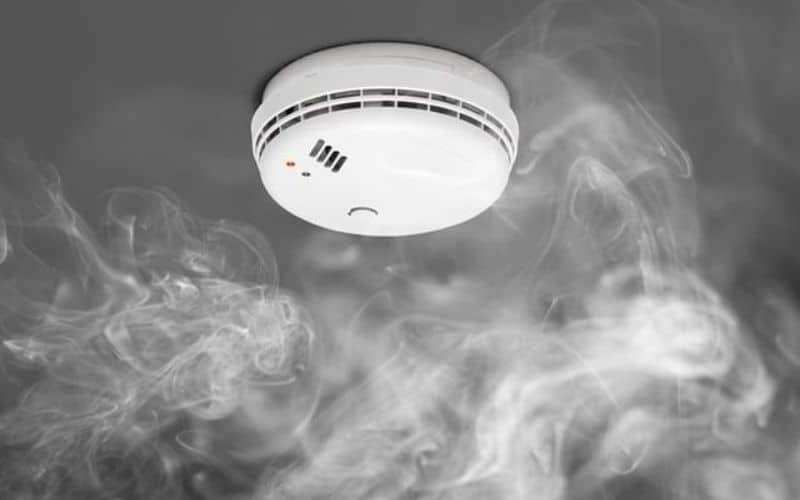
An RV carbon monoxide detector has three different beeps or beeping schemes that are based on the conditions in the room it monitors, or to let you know that there is an issue with the carbon monoxide detector itself.
1. Emergency 4 Beeps & Pause
If your RV’s carbon monoxide detector beeps four times, pauses for a moment and beeps again it has detected a dangerous level of carbon monoxide gas building up. You need to ventilate and vacate the RVs as soon as possible.
2. Low Battery 1 Beep Per Minute
An intermittent beep once a minute typically indicates a low battery. Since most RV CO detectors are battery-powered instead of hardwired. All you need to do is replace the batteries and restart the unit.
3. Alarm Malfunction
RV carbon monoxide detectors have a finite lifespan and they have redundant self-monitoring systems that let you know when they aren’t operating correctly.
This might be a malfunction with the detection chamber or a fault in the microchip. Sometimes you can simply reset the device.
Though it’s just as likely that the device has reached the end of its life, and needs to be completely replaced.
4. Error Detected
There are some physical and mechanical problems that can cause errors in how the CO monitor operates.
Something as simple as dust buildup in the internal detection chamber can cause a fault in the unit’s ability to detect the concentration of carbon monoxide in the air.
Since it is also self-monitoring the beeps will let you know to clean, or outright replace the unit to ensure proper, safe operation.
Frequently Asked Questions
Am I Required By Law To Have An RV Carbon Monoxide Detector?
If your RV carbon monoxide detector is beeping and you’ve determined that it’s not related to the presence of CO gas, you might be tempted to do away with it, and travel without one.
Though it’s important to note that as of 2005, anywhere that people sleep must have a carbon monoxide detector of some form.
This means that since you will be sleeping in your RV, it must have a working carbon monoxide detector by law. Though the regulations can vary by state.
This isn’t the sort of thing that you will get a ticket for, but it will be noted if you want to sell your RV in the future and the interested buyer or the loan underwriter requests an inspection.
How Long Does A Carbon Monoxide Detector Last?
A typical RV carbon monoxide detector will usually have a lifespan of 5 to 7 years, with a few high-end models lasting up to a decade.
Freeze-thaw cycles when the RV is in storage can also accelerate the death of a carbon monoxide detector. Especially if the internal battery freezes.
How Many Carbon Monoxide Detectors Do I Need In My RV?
If your RV carbon monoxide detector is beeping to notify you or an error or it is at the end of it’s life, you will need to replace it.
In a case like this, you might want to consider upgrading to more than one carbon monoxide detector in your RV.
The International Association of Fire Chiefs recommends keeping a carbon monoxide detector within 10 feet of each bedroom door.
This means putting one near your RV’s master suite, as well as in the main living area if it has a convertible sleeping space.
How Much Does A Replacement Carbon Monoxide Detector Cost?
If your carbon monoxide detector has been beeping to tell you it’s at the end of it’s life, you can usually find a replacement carbon monoxide detector for less than $25.
There are even some models that integrate a smoke detector and carbon monoxide detector into one.
- 1: Ecoey GS811-A Carbon Monoxide Detectors
- 2: Lecoolife GS528A Smoke and Carbon Monoxide Detector
- 3: Siterwell Electronics AP-6987 Carbon Monoxide Detector

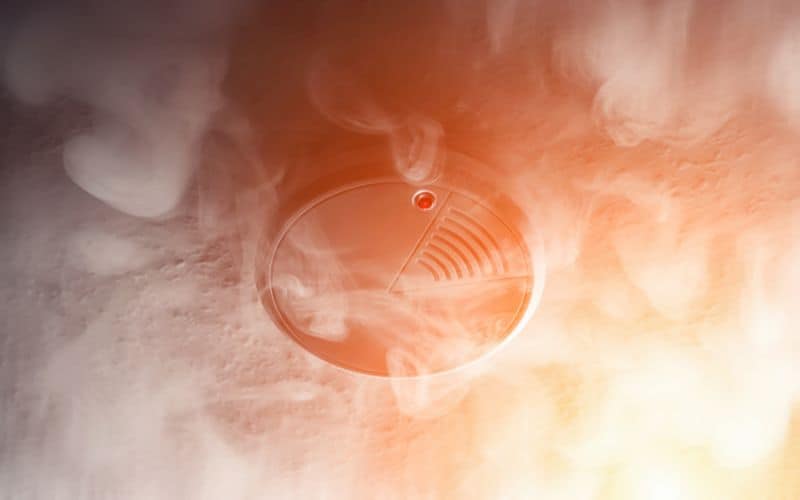
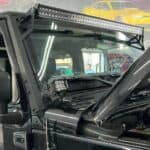


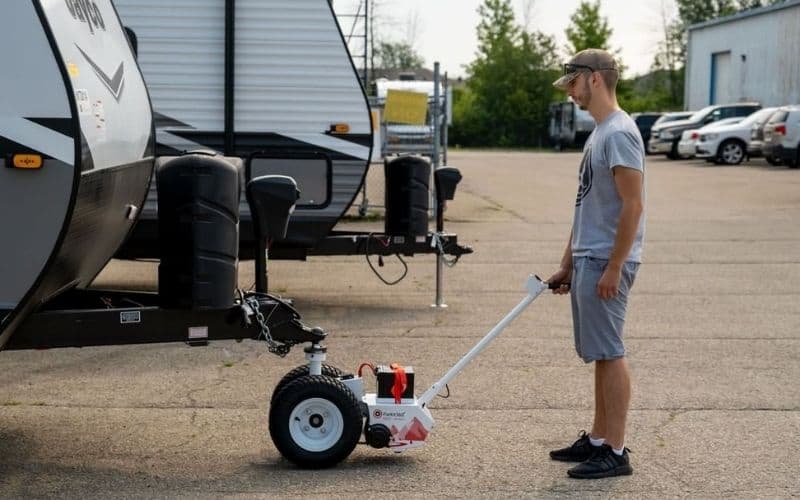
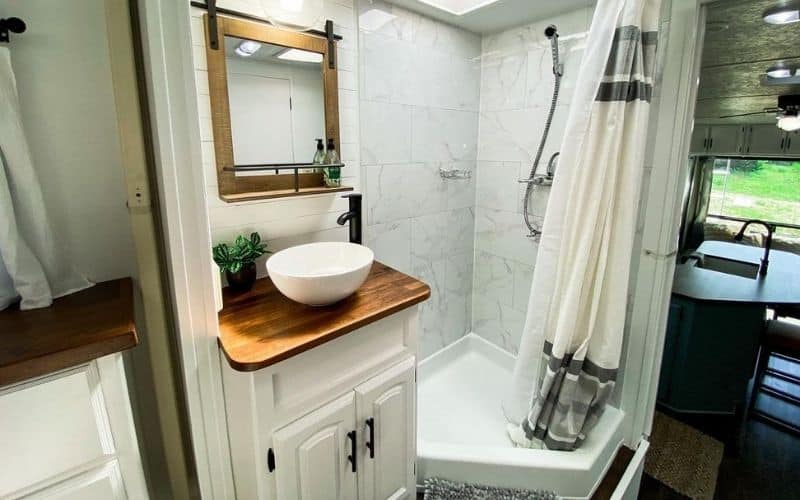
2 Comments
Brenda Gauldin
9 months agoSounMy carbon monoxide detector is beeping . two green flashes and two red flashes then chirp. I have a 2017 ROKEE WOLF PUP. I don’t use propane at all. I just use electric. It is 2:47AM . door open any suggestions?
Brenda Gauldin
9 months agosounds good hope I get answer